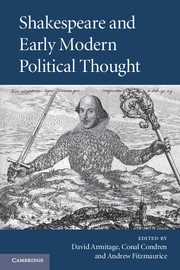Book contents
- Frontmatter
- Contents
- List of contributors
- Acknowledgements
- List of citations and abbreviations
- Introduction
- PART I CONTEXTS
- 1 Shakespeare's properties
- 2 The active and contemplative lives in Shakespeare's plays
- 3 Shakespeare and the ethics of authority
- 4 Shakespeare and the politics of superstition
- PART II THE COURT
- PART III THE COMMONWEALTH
- Afterword: Shakespeare and humanist culture
- Index
1 - Shakespeare's properties
Published online by Cambridge University Press: 18 January 2010
- Frontmatter
- Contents
- List of contributors
- Acknowledgements
- List of citations and abbreviations
- Introduction
- PART I CONTEXTS
- 1 Shakespeare's properties
- 2 The active and contemplative lives in Shakespeare's plays
- 3 Shakespeare and the ethics of authority
- 4 Shakespeare and the politics of superstition
- PART II THE COURT
- PART III THE COMMONWEALTH
- Afterword: Shakespeare and humanist culture
- Index
Summary
Shakespeare has long been a byword for elusiveness. In the late seventeenth century, John Aubrey recorded a tradition that ‘he was not a company keeper … wouldnt be debauched, & if invited to writ; he was in paine’. This would seem to conform to the self-image of a writer who lamented in Sonnet III that fortune ‘did not better for my life provide / Than public means which public manners breeds’, and there confessed that ‘my nature is subdued / To what it works in, like the dyer's hand’. We have no letters from Shakespeare, no books certainly from his library and none of his literary papers, save for the passages attributable to him in the manuscript of The Book of Sir Thomas More. Whether this elusiveness was the result of deliberate evasiveness is more difficult to tell: the evidence is contradictory. For example, Aubrey reported another tradition that Shakespeare was in fact ‘very good company, and of a very readie and pleasant smooth Witt’. The voice in Sonnet III might not be Shakespeare's at all: the poem's act of self-revelation serves only to conceal the self. And the absence of books and private papers could easily have arisen from accident rather than design. Whatever the reasons, there is general agreement about the impalpability of Shakespeare the man: ‘Alone of the major artists of the Renaissance, Shakespeare has no tangible personality outside his art.’
Shakespeare's shadowiness presents especially acute problems for students of political thought. The earliest biographical traditions, such as those collected by Aubrey, shed no light on his affiliations.
- Type
- Chapter
- Information
- Shakespeare and Early Modern Political Thought , pp. 25 - 43Publisher: Cambridge University PressPrint publication year: 2009



